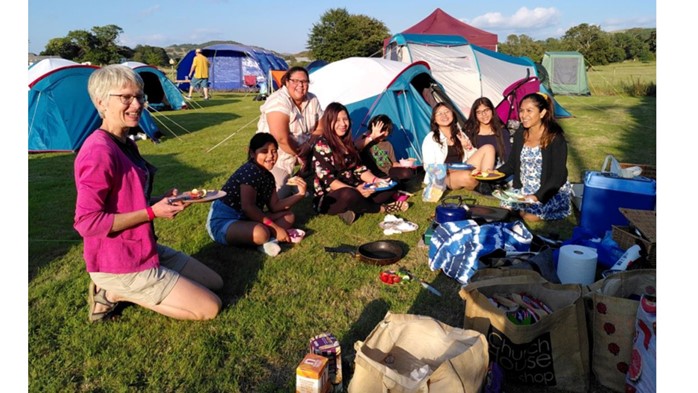
El Sueño Existe: The spirit of Victor Jara lives on in Wales
During an inspiring weekend (9th 10th 11th August) West Wales will reverberate to the unlikely sounds of Latin American music with a distinctly political twist as the El Sueño Existe festival - ‘The Dream Lives on’ - is celebrated among the green hillsides of Machynlleth, West Wales (SY20 8ER).
The festival, inspired by the music and political vision of legendary Chilean singer-songwriter Victor Jara, has become something of a fixture in the calendar of folk music and progressive ideas. This year’s festival will feature a wealth of musical acts headlined by the Frida Violeta Band – an all-women band from Cambridge blending any number of musical heritages. They’ll be returning after their barnstorming set during last year’s ‘Chile 50 years on’ mini-festival. Alongside them will be Tinku Puros Bolivian dance troop, Welsh singer songwriter Martyn Jospeh, Grupo Limache, an 8 piece Chilean folk / social comment band on tour, Zona Marginal, a Colombian rap band, plus an array of local and international troubadours who make it over the Welsh hills to Machynlleth.
Each edition of the festival focuses on specific issues, and this year’s themes are Bolivia and the Amazon, and the global struggles for climate justice. A number of Bolivians living in the UK will be contributing, including the wonderful ‘Wiphalas Across the World’ and poet and film maker Giovanna Miralles.
Speakers confirmed to take part in a wide range of workshops throughout the weekend include Dr Francisco Dominguez, Sian Phillips (sister of murdered Amazon activist and journalist Dom Phillips), Anthony Slaughter, leader of the Green Party of Wales, Paul Allen from the Centre for Alternative Technology in Machynlleth, Carlos Zamora, a classical composer of an orchestral symphony weaving together Victor Jara’s music. There are many more, including Henry Stobart, an expert in Bolivian indigenous music, and Jeanette Rojas who will be playing as part of Bolivian trio Sagrada Familia and leading a session on indigenous instruments and styles. Dr Andrew Redden will be exploring Incan creation myths and cosmovisions; Sarah Shenkar from Survival International will be talking on Amazon cultures especially those in least contact with Brazilian society; Sen Munoz will be bringing his expertise from War on Want campaigning; and Claudia Turbot Delof will be representing ‘Wiphalas across the World’ solidarity movement.
As ever we are delighted to have great media support from our friends at Alborada films, and Jeremy Corbyn’s Peace and Justice Project, though Jeremy won’t be able to make it this year. New for this year will be a ‘festival within the festival’ organised by Latin America Bureau (LAB), highlighting their longstanding work in publishing and campaigning.

El Salvadorean asylum seekers getting a great festival experience at festival 2022
The ongoing demand for a just transition to net zero will be our overarching environmental/political theme. There will be input from XR Machynlleth and other climate justice campaigners, together with reports from across Latin America from the frontlines of the climate struggle we all share.
El Sueño Existe attracts a vibrant mix of Chileans who found a haven in Britain in the 1970s, veterans of solidarity campaigns here, and the younger generations who have inherited the wealth of both Latin American and British & Welsh cultural traditions. The touchstone is Victor Jara himself, a Communist and passionate supporter of Allende’s government, who was among the thousands of Pinochet’s victims, tortured and savagely murdered at the age of 39, for being a voice of the people. Unlike his tormentors, his legacy has become recognised as being artistically unique – an eloquent testimony of the flagrant injustices in Chilean society, and a call to arms to remedy them. As with every festival there will be a strong Chilean input, with news from the EcoMemoria project, planting trees to create a new woodland as a memorial to those who disappeared and have no grave. There will also be tributes to Victor’s widow Joan Jara who died in 2023, and Alfredo Kordal, a great Chilean exile poet.

Visitors to the festival can expect the unexpected, whether it is a lyrical poetry performance from Latin American women’s writers’ group ‘Las Juanas’, a Liberation Theology participatory mass led by radical retired priest Roger Redding, or an indigenous instrumental procession, a full-on dance concert to show off those salsa moves, or some fine examples of Bolivian film making, together with food stalls, camping etc. – we aim to nourish the soul as well as the body! A number of town venues will be used for workshops and smaller concerts, all within a 10 mins stroll of the main site, Y Plas. All venues are wheelchair accessible.
Perhaps the last word should go to one of the Chileans, Idulia, exiled here since 1975, who has attended several El Sueño Existe festivals : ‘The festival is the one place in Britain where I really feel I belong.’ If you only have spare cash for one festival this summer, make sure it is this one!
Weekend tickets £60/£80/£100 solidarity price + camping, campervans + programme updates, information on volunteering (8 – 12 hrs volunteering for a free weekend ticket) local accommodation etc. all via the festival website. Contact: This email address is being protected from spambots. You need JavaScript enabled to view it.l.com.




